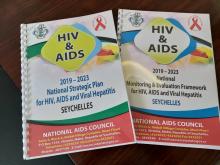Seychelles launches its third multi-sectorial National Strategic Plan for HIV, AIDS and Viral Hepatitis to guide interventions for the next five years
Victoria, Seychelles, 22nd May 2019 - The HIV epidemic remains one of the major public health and development challenges in Seychelles. The country has a concentrated HIV epidemic with high levels of HIV amongst certain key populations at higher risk of HIV exposure including the youth, people who inject drugs, men who have sex with men and sex workers. The country’s HIV and AIDS situation was echoed during the launching of the National Strategic Plan for HIV, AIDS and Viral Hepatitis 2019-2023 (NSP) which took place recently in a ceremony at the Savoy Resort in Beau Vallon, Seychelles.
With the support of the UNAIDS and WHO, the National AIDS Council (NAC) and the Ministry of Health has been working with all stakeholders since the end of the second Strategic Plan in 2016 to develop the third National Strategy which covers period 2019-2023. The 2019-2023 National Strategic Plan for HIV, AIDS and Viral Hepatitis (NSP) and its Monitoring and Evaluation Framework was officially launched by the President of the Republic Honorable Danny Faure who was the Guest of Honor at the event last Friday. The ceremony was attended by high level representatives including the Minister of Health Honorable Jean Paul Adam, other government Ministers, members of the National Assembly and the WHO Representative to Seychelles Dr. Teniin Gakuruh. Various key stakeholders were also present at the event amongst whom representatives from various non-government organisations (NGOs) and community groups including youth and the elderly.
Delivering his opening address, the Health Minister Jean Paul Adam called on all to work together to implement the Plan.
“I urge everyone this afternoon to join together to recommit ourselves to a Seychelles where there are no new HIV, Aids cases, where everyone knows their status, where stigma is never tolerated, where treatment and counselling is available to all. These are the pillars on which this plan rests and these pillars will be built by all of us”.
Accepting a copy of the Strategic Plan from the Minister, the President of the Republic Honorable Danny Faure expressed the government’s commitment to continue to fight to curb the HIV, AIDS concentrated epidemic in the country.
“The Strategic Plan and its Monitoring and Evaluation are expressions of our pledge as a nation and determination to face HIV, AIDS and Viral Hepatitis, not only as a medical and health problems, but also to address them as cultural, social and economic issues, affecting all communities of our society and every Seychellois family” said President Danny Faure.
National Strategic Plans for HIV and AIDS are established tool for directing and coordinating national efforts in the fight against HIV and AIDS, and ensures all interventions are relevant, targeted and evidenced-based for maximum impact. The development of the Seychelles NSP 2019-2023 was initiated in 2016 with extensive consultations with key government and NGO experts and civil society representatives conducted over the last two years. An end-of-term review of the progress made under the NSP 2012-2016 was conducted throughout 2017 and 2018 which resulted in the identification of key priorities for the 2019-2023 response. The National Strategic Plan for HIV, AIDS and Viral Hepatitis contains indicators and targets to be achieved by 2020 and beyond, which include the 90-90-90 targets for HIV and AIDS set by the UNAIDS. Through the NSP, Seychelles is committed to work towards achieving 90% of people living with HIV knowing their status, 90% of people living with HIV who know their status receiving treatment and 90% of people living with HIV on treatment having suppressed viral load. In addition, the country also commits to 90% of key populations having access to HIV prevention services and 90% of people living with HIV, at-risk or affected reporting no discrimination. The NSP clearly details 7 priority outcomes for the next five years which include increasing uptake of testing and counselling, reducing new HIV infections, the effective implementation of test and treat, improving identification, treatment and management of co-infections and increased adherence of PLHIVs on treatment. In addition, the NSP stipulates increased protection of the rights of people living with HIV and AIDS and improving the enabling environment for HIV prevention, treatment and care are key outcomes.
WHO will continue support the NAC, MoH and partners in achieving the specific goals and outcomes as set out in the NSP. In 2017, WHO supported the conduct of an in-depth analysis of the quality of HIV and Hepatitis programmes in place in Seychelles to see if it is in line with national, regional and global standards to achieve the 2020 targets and Sustainable Development Goals (SDGs). At the moment, WHO is providing technical support to the development of the HIV, STIs and Hepatitis testing and treatment guidelines for Seychelles. In line with the WHO recommended four prolonged strategies to reach pregnant women, their partners and infants, including key populations, the organization is also currently supporting the country’s documentation processes to achieve Elimination of Mother to Child Transmission of HIV and Syphilis (EMTCT) status in the coming years.
The number of people living with HIV (PLHIV) in the Seychelles by the end of December 2017 is estimated at 676 persons. A total of 120 new HIV cases was reported for the year 2018. A cumulative of 177 AIDS related deaths was reported for the period 1993 to December 2017. The country introduced Highly Active Antiretroviral Therapy (HAART) in 2001.



